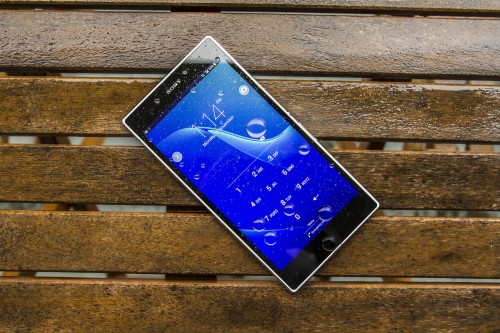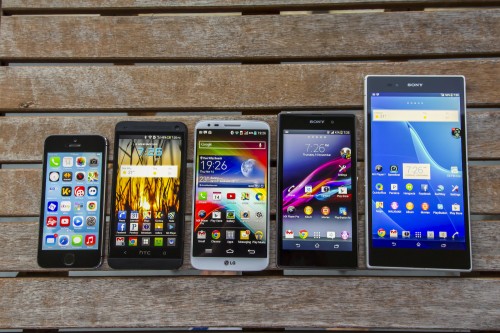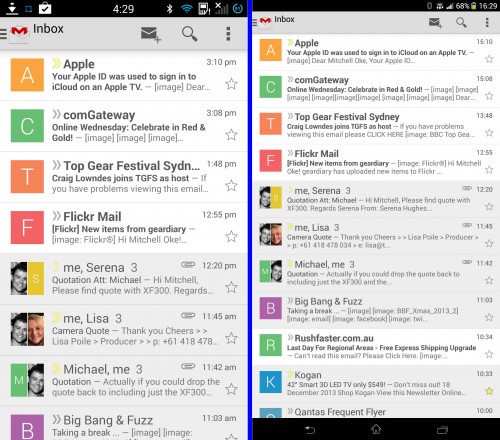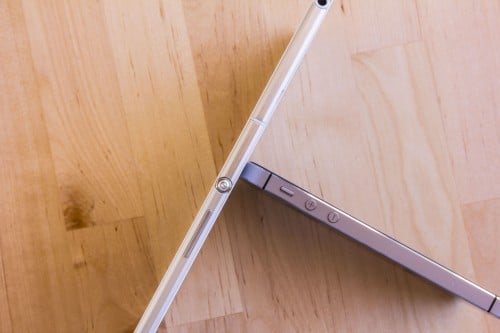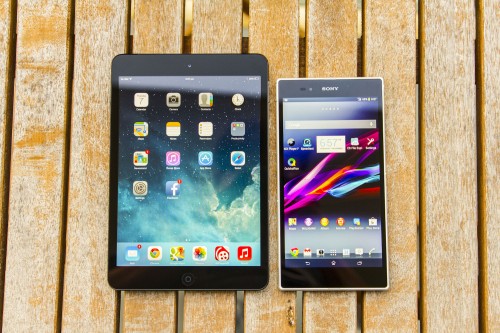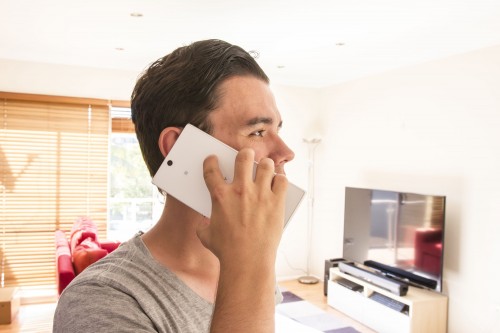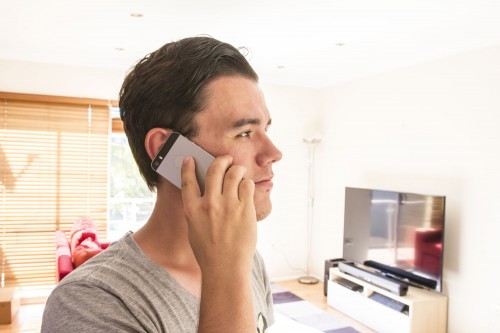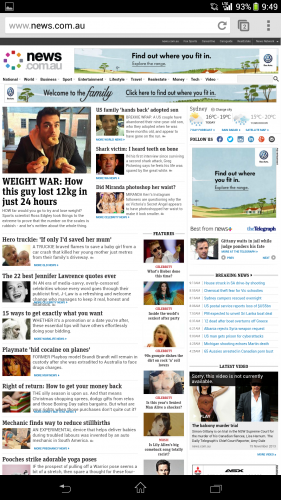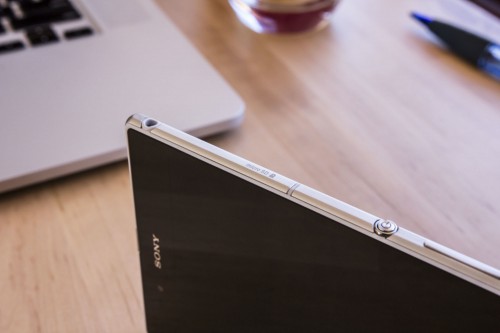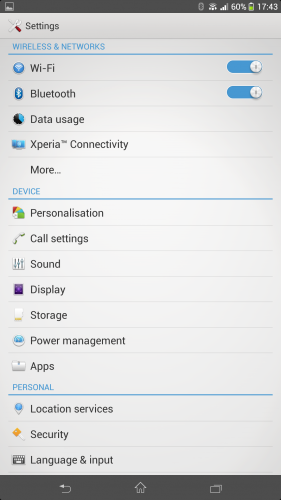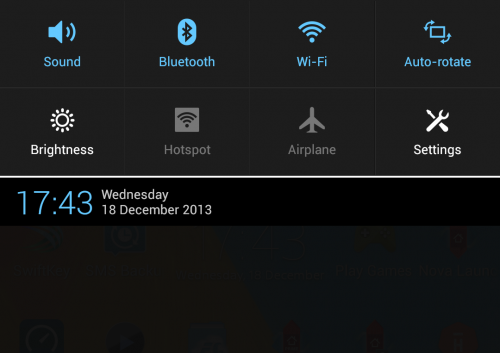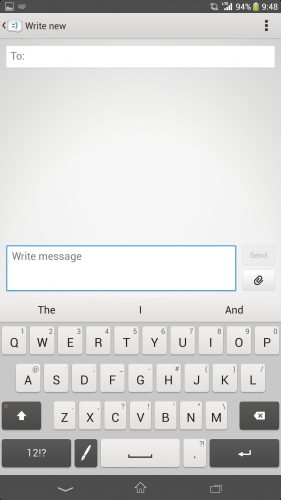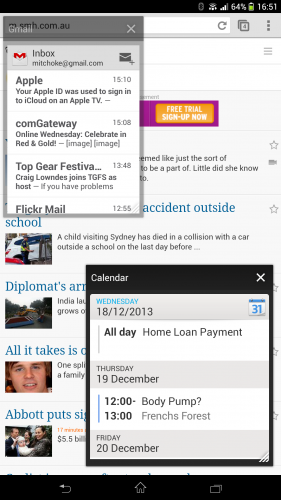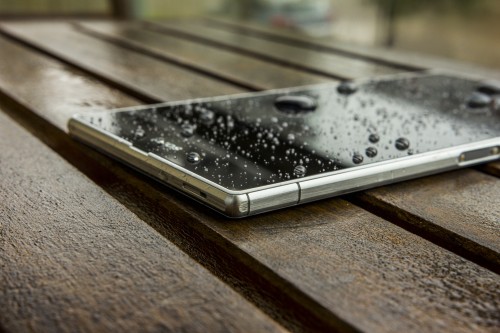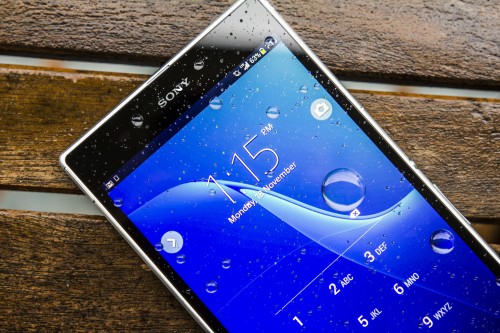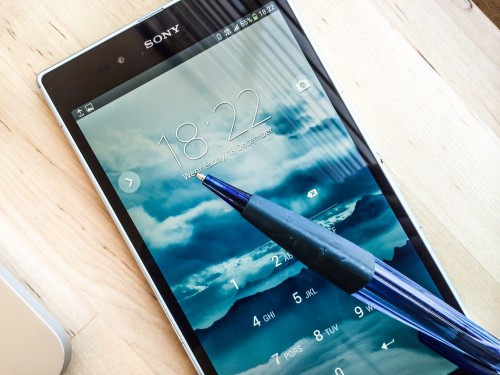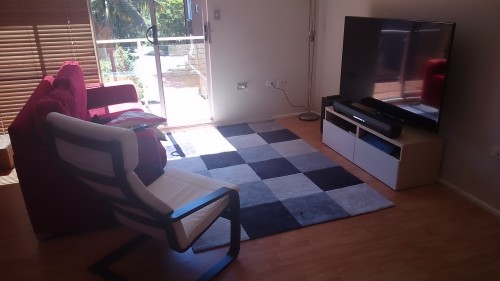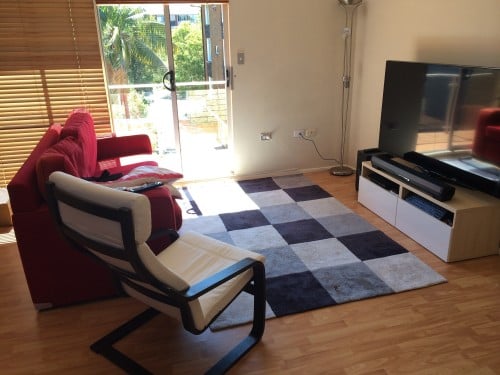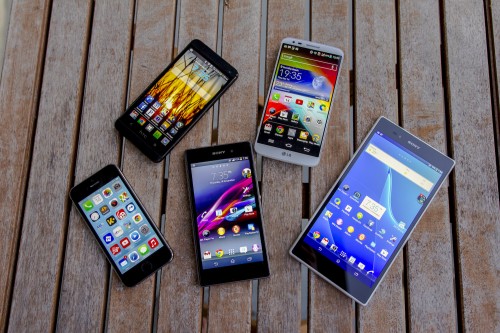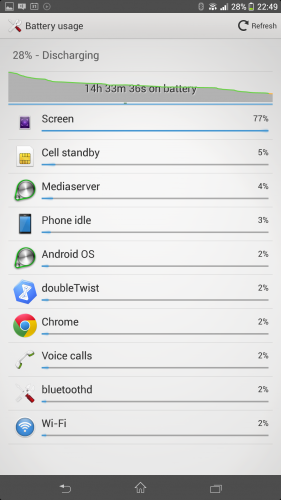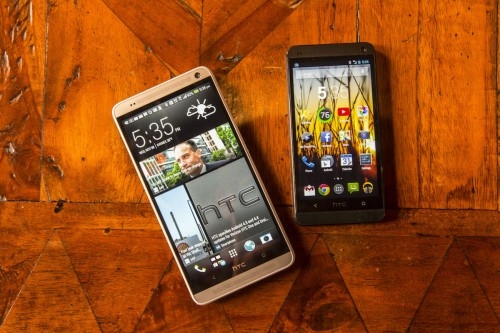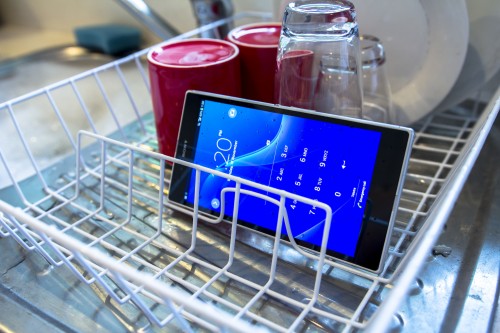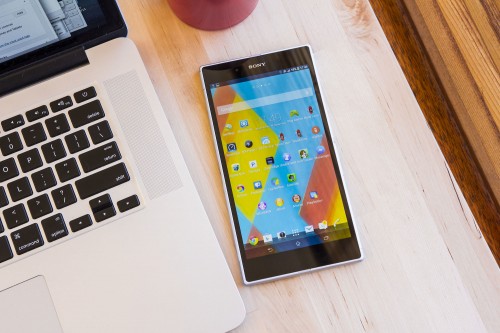I’ll admit I’ve never understood the large-screened “phablet” craze. I just can’t see the appeal of phones that are too large to comfortably fit in a jeans pocket, but too small to really replace a tablet for a more grown up web browsing or reading experience.
It was with this apprehension that I approached the Sony Xperia Z Ultra. This device either took the phone screen size to extreme, or the tablet size to micro proportions.
Initially I began using it as I would use the latter, a tablet that complimented my smartphone rather than replaced it. Teamed with the compact iPhone 5S, this combination worked rather well, but it wasn’t until I ditched the iPhone and made it my main device that I began to understand the appeal.
The Sony Xperia Z Ultra is defined by its 6.44-inch 1080p display. This is less than 10% shy of the 7-inch compact tablet standard established by devices like the ASUS Nexus 7.
I’ve never been impressed by displays on Sony smartphones, they always look washed out and have poorer viewing angles than similarly priced devices.
The Sony Xperia Z Ultra is the first that has wowed me. With vibrant colours, good viewing angles and excellent usability outside, this is a wonderful device to use from a visual perspective.
The extra room afforded by the display size is employed extremely well, as the Xperia Z Ultra makes use of a higher “virtual DPI” as it were, allowing more information to be displayed on the screen at any one time. This is very important to note, as not all large-screen devices do this. The effect is described by Google here.
Considering my HTC One shares the 1920×1080 resolution on it’s 4.7-inch display, it’s great to see Sony doing more with the additional 1.74-inches of physical room on offer.
The Xperia Z Ultra doesn’t disappoint in other specifications either, with a speedy Snapdragon 800 clocked at 2.26Ghz, 2GB of RAM, 4G LTE and 16GB of storage augmented by a microSD slot.
While it shares the resolution of the latest version of Nexus 7, it’s crammed into a far slimmer package. The Xperia Z Ultra would have to be one of the sleekest devices on the market at just 6.5mm. Compare that to the already-svelte iPhone 5S at 7.6mm and the positively portly LG G2 at 8.9mm.
All this does come at a heft, however, with the Xperia Z Ultra tipping the scales at 212g. It’s exactly 100g more than the iPhone 5S and 69g on the LG G2, but thanks to the way it’s spread out it never feels like it. It’s well distributed throughout the phone, too.
Looked at as a tablet, the Xperia Z Ultra is remarkably compact, but switch tact to think of it as a phone, and it’s borderline hilarious. It incorporates all the traits required to be a phone, including an earpiece and auto-screen off when held to your head, but be prepared to get noticed.
This isn’t conjecture either, as it drew quite a lot of stares as I stood outside my local coffee shop chatting away as I waited for my morning dose of caffeine.
It’s rather uncomfortable to use as a phone, too. The large, flat dimensions mean it sticks out from your head on all sides, and never really “gels” with your face. Say what you will about bendy smartphones, but at this size it almost sounds like a solution to the problem. The earpiece isn’t very loud, nor is the loudspeaker when used for speakerphone or music.
Frankly, the Sony Xperia Z Ultra is best used with either a wired or wireless headset. The former is quite socially acceptable, but the Bluetooth Borg look isn’t something I’ve ever embraced. I’d prefer to hold the Z Ultra to my head.
Living with the Xperia Z Ultra on a daily basis is far more useful than I could have imagined. Does it do more than my HTC One? Not really, but it’s the experience that feels quite different.
While a 5.7-inch display on a “phablet” doesn’t feel especially different to using a phone (except being more awkward at times), the 6.44-inch display on the Sony Xperia Z Ultra bridges the phone-tablet divide remarkably well.
Most mornings I’d take my iPad Air down to the coffee shop if I was staying for breakfast, since it’s a great way to catch up on both local news and read my favourite tech sites. The Xperia Z Ultra has all but eliminated that compulsion, as it’s size is a delightful compromise of screen size versus carrying a second device.
Most sites display their mobile versions by default, but aforementioned DPI setup means that more is displayed at all times. I have good eyesight, so the size is perfect.
Video playback is similarly impressive, where its 16×9 aspect allows the whole display to be utilised, compared to my 4×3 iPad Air.
The inclusion of a microSD slot means it’s unlikely you’ll run out of space. 64GB microSD cards are stupid cheap now, making for just over 70GB of usable storage when including the internal storage.
On the software front, Sony has shown far more restraint than some of its competitors. Where Samsung and LG have changed practically every single pixel of the Android interface, Sony’s effort is very mild.
The colour scheme retains the blue and white elements of stock Android 4.2.2, with minor changes to the aesthetic of the launcher and Settings panels. The notification shade contains Sony’s own quick toggle bar that can be customised with as many or as few switches as you like.
It’s not pure Android, but Sony has surprised a lot of people by introducing a Google Play Edition of the Xperia Z Ultra which is!
The keyboard has similarities to third-party keyboards, including long press for numbers and symbols across the whole keyboard. SwiftKey is still my Android keyboard of choice, but for those who don’t stray from the standard inclusion, the Sony effort is a good one.
The one thing I would have loved to see is a feature akin to Samsung’s excellent Multi-Window. Considering the large display, and its higher virtual DPI allowing more to be displayed in the same space, it would be a perfect addition to the Xperia Z Ultra. It does feature “floating windows” like some LG devices, but it’s just as pointless here. The way it covers part of the content in the main window makes it just annoying.
A neat trick the Xperia Z Ultra has up its sleeve is waterproofing. Fitted with seals around the microUSB, microSIM and microSD slots and a waterproofed headphone socket, the Xperia Z Ultra will happily get splashed or even fully submerged without ill effects.
After an outing at the beach I hosed the sand off the Xperia Z Ultra, much to the interest of passers-by.
Don’t expect to use the Xperia Z Ultra in a downpour, however, as water reacts with the capacitive touchscreen to produce many an unwanted tap or swipe.
The display is, however, extra sensitive, and will respond to the taps of most ball-point pens. It’s hardly a substitute for the S Pen used on the Galaxy Note 3, but it’s nifty, none the less. Be careful though, I think my Xperia Z Ultra picked up a few minor marks because of this.
Around back is the 8-megapixel camera, which takes decent if unremarkable photos. There seems to be an awful lot of processing going on between real life and the JPEG, as edges and smooth gradients tend to get pretty crunchy very easily.
Fine textures are smoothed out, white balance is easily thrown and its dynamic range clearly isn’t as good as the iPhone 5S. Of note, the iPhone 5S shot weighed in at 2.2MB, while the was less than 900KB.
Thanks to its large surface area (certainly not its waistline), Sony have filled the innards with a 3050mAh battery, on par with big-batt phones like the LG G2 (3000mAh) but just shy of the phablet king, the Samsung Galaxy Note 3 (3200mAh).
While it doesn’t have the staying power of the LG G2 (review coming soon), it can more than make it through a heavy day of texting, emailing, web browsing and media playback. I frequently use my phones as Bluetooth music sources when driving, so that tends to add a bit of extra strain to the battery too.
Sony have clearly implemented some sort of quick charging protocol, as it takes far less time to recharge than my HTC One, which has a much smaller 2300mAh battery.
The only other mainstream competition at this size is the HTC One Max. I’ve used the HTC One Max briefly at its Australian launch recently, and while it is a quality piece of hardware, it lacks the sleek design of the Xperia Z Ultra, and makes far less use of its gargantuan dimensions with a smaller 5.9-inch display.
So what is the Sony Xperia Z Ultra, a phone or a tablet? I can’t tell, but in the last few weeks I have tried it as both a companion and a daily, and it easily slips into the latter role very well. Its reasonable price (AU$799 unlocked) is another win in its favour, and makes other Android flagships and the iPhone 5S look downright pricey.
For that money, you’re getting top of the line specifications, waterproofing, and a solid build quality in a rather unique device that straddles the roles of tablet and phone with amazing skill.
It wouldn’t be my only phone, however. During the week when I’m carrying a messenger bag or otherwise have my hands free, the Xperia Z Ultra isn’t a particular chore to carry around. Heck, it even fits rather nicely into the pocket of a baggy pair of shorts.
Slip on some jeans for a night out though, and the size hits a practicality wall.
Teamed with a compact phone for such excursions (be it an iOS or another Android device) the Xperia Z Ultra is something I could seriously add to my kit permanently. This is a GREAT device.
MSRP: AU$799 unlocked
What I Like: 6.44-inch display, sleek profile, smooth performance, waterproofing
What Needs Improvement: Multi-window would be awesome, camera is average
Source: Manufacturer supplied review sample

